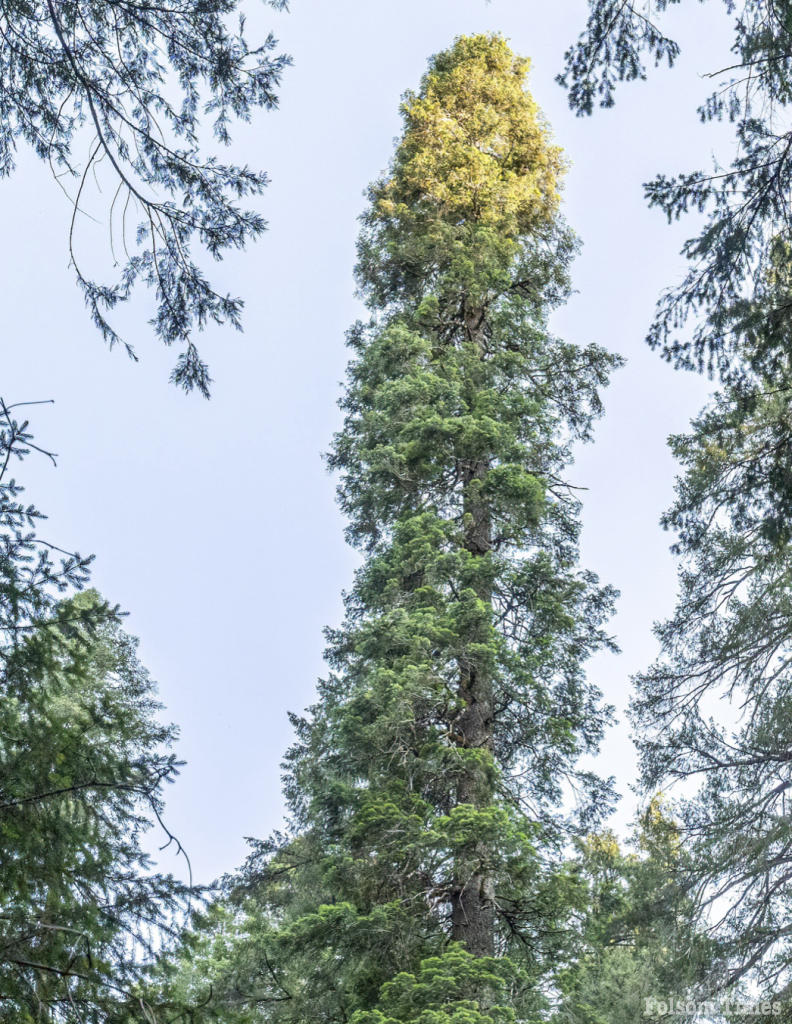A mere four days before the Caldor Fire erupted in Grizzly Flats, CA in August of 2021, our friend the tall tree hunter Michael Taylor emailed us that he had located “a special grove of towering white fir” as he was scanning the LiDAR imagery for Eldorado National Forest in the vicinity of Pollock Pines outside Lake Tahoe. Excited by the prospect of surveying the previously unknown and exceedingly tall white firs, he wrote, “We should go there ASAP.”
His sense of urgency was hauntingly prescient, for just as Taylor was mobilizing to measure and document the trees, the Caldor Fire ignited – most likely as a result of target-shooting practice – less than ten miles away from the grove. It quickly grew into a terrifyingly hot, wind-whipped firestorm.
As the fire raced towards his trees of interest, Taylor switched gears and instead nervously monitored the fire’s movements and behavior to predict if the precious tall, old trees would survive. Afterwards, when roads were still closed for obvious safety reasons, he scrutinized post-fire satellite imagery of the destruction zone to find evidence that the trees were alive. Thanks to his careful research, he believed that they were!
Finally, earlier this month, he was able to visit the site with fellow big tree hunter, photographer and birder Joshua French. The pair were astonished at what they found.
In a deep, steep-sided drainage, an enormous white fir towered above Douglas-fir, ponderosa pine and even sugar pines. White fir typically “grow fast and die young,” and are not known to reach great age or impressive heights. Yet, in this moist little canyon, a magnificent white fir grows in a unique position where it can directly tap into a creek and has been forced to successfully invest in vertical growth to catch enough sunlight to grow competitively amidst neighboring species that are usually taller.
Taylor and French reached the tree late in the day, but the towering crown still caught the light of the setting sun in a radiant green-gold glow.
The pair exuberantly measured and photographed the tree, which they dubbed “Firetop,” and found it to be 265.87 ft tall. Most sugar pines – the tallest pine species – rarely ever reach over 250 ft, so a white fir of such stature is a rare treasure, indeed.
The tree is over 16 ft around and just over 5 ft in diameter. Though slightly scorched by the fire at its base, Firetop is alive and well and is the commanding new world champion white fir. The tree, as French put it, “completely shattered” the previous record – a 257.5 ft white fir discovered in 2020 by Duncan Kennedy.
Within the wet Firetop gully, the Caldor Fire only burned at low intensity, but the surrounding area experienced moderate to high severity fire. On a hillside less than 300 ft away, salvage logging is actively taking place to clean up the mess and make some meagre profit out of the Caldor’s carnage. Although Firetop lies on Eldorado National Forest land, it is bordered by Sierra Pacific Industries (SPI) land that is being heavily logged.
Taylor and French worry that the tall, old white fir and neighboring survivors – large white fir, ponderosa, Douglas-fir and sugar pine also withstood the inferno – could all too easily be harvested by the logging operations. They want to bring this new world record white fir to the attention of the Eldorado National Forest and the public to ensure that it is managed responsibly. Taylor thinks that establishing a buffer zone to protect these big trees is a good idea. French wants SPI to know that “the tree is being watched” and that any illegal harvest will be noticed and not tolerated.
One of the major ecological benefits of big, old trees is that they are more fire resistant – largely because they have thicker bark, for one – when fires sweep through. What is more, as the inevitable survivors of fire, their seeds are dispersed across the freshly burnt landscape to regrow a healthy forest. Natural regeneration of Douglas-fir, white fir, sugar pine and ponderosa is already evident in the vicinity of Firetop; a positive sign for the future.
White fir generally has a bad reputation because it grows in highly flammable, overly dense clumps with boughs that reach nearly to the ground – and thus tends to exacerbate fire risk by acting as ladder fuel. Old-growth white fir like Firetop is much less fire prone and more valuable to the forest ecosystem over time, however.
Taylor and French hope that by sharing the news of their incredible discovery, Firetop will continue to survive, thrive, and be part of a healthy, new forest in the wake of the Caldor Fire.
No less important is the ability of such natural masterpieces to enthrall and inspire. If you think about it, you have probably driven by this spectacular tree while en route to or from Lake Tahoe on Highway 50 countless times yet never known about or appreciated its existence until now. May this story also be a lesson that our forests – and the natural world in general – hold countless more treasures that await our collective discovery, attention, and respect… and are probably in need of protection.
Tressa Gibbard has been working for the Sugar Pine Foundation since January 2010 in the capacity of grant-writer, editor, design guru, events and planting organizer. Tressa holds a Bachelors degree from Penn State University, where she majored in Environmental Studies.She has over a decade of experience working as a field biologist throughout California and many other western states. She was introduced to the Sugar Pine Foundation as a participant in the 2006 Tahoe-Baikal Institute Summer Environmental Exchange program, and was previously a seasonal volunteer with SPF. When she’s not saving the sugar pines, Tressa can generally be found playing in the mountains.





